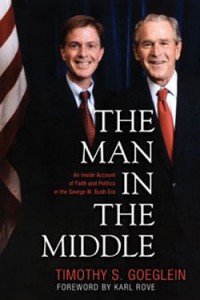By Erin Roach

When former White House aide Timothy Goeglein realized he had been caught in a plagiarism scandal, he collapsed as a broken man, gripping the cross of Christ and genuinely hating himself.
After nearly eight years as deputy director of the White House Office of Public Liaison, serving as the key point of contact between President George W. Bush and faith-based leaders, Goeglein had been exposed. He had “knowingly and repeatedly” plagiarized columns in his hometown newspaper.
“I was deceptive, and it was all rooted in vanity and pride,” Goeglein writes in his memoir, “The Man in the Middle” from B&H Publishing Group, a division of LifeWay Christian Resources of the Southern Baptist Convention.
Goeglein promptly resigned his post in disgrace and prepared for a “much-deserved woodshed moment” with Bush. Instead, he experienced what he describes as the greatest professional moment of his life.
“Tim, I want you to know I forgive you,” Bush said at the start of their Oval Office meeting.
“But Mr. President, I owe you …,” Goeglein said, according to the book.
“Tim,” Bush said, “I have known mercy and grace in my own life, and I am offering it to you now. You are forgiven.”
The president spent some time reminiscing with Goeglein about the previous seven and a half years, and Goeglein prepared to leave the White House for the last time.
“Tim,” Bush said, “I would like you to bring Jenny and your two sons here to the Oval Office so I can tell them what a great husband and father you are.”
The forgiveness Bush extended to Goeglein that day was rooted in the president’s personal experience with forgiveness, the aide said. In his book, Goeglein wrote, “The grace he showed me upon that exit was a reflection of his faith in Jesus Christ. It was also a deep reflection of who the man really is. His grace set me out on a journey of recovery, where I found healing and peace as a result.”
Goeglein had worked for Bush from the 2000 campaign until his resignation in early 2008, largely conveying messages from Bush to the faith community and vice versa.
In his memoir, Goeglein, who now serves in Washington as vice president of external relations for Focus on the Family, specifically mentions Southern Baptists twice.
As he describes his role in the White House, Goeglein wrote that he became the point-man for a host of faith-based groups and ministries, including the Southern Baptist Convention and its public policy arm, the Ethics & Religious Liberty Commission.
“I worked to make purposeful relationships the centerpiece of my work as a reflection of the foundation of my life, Jesus Christ,” Goeglein wrote.
A chapter on debating the definition of marriage lists the Southern Baptist Convention as among the groups strongly favoring a federal marriage amendment to protect the traditional definition.
“These groups formed the nucleus of support for the emerging constitutional amendment, and I was in touch with all of them regularly,” wrote Goeglein, who worked directly under former deputy chief of staff Karl Rove.
“They provided a superb framework for thinking about the national ramifications for marriage, and though they were eager for the president to endorse an amendment, they understood the necessity of the thoughtful nature the president was pursuing in coming to a final decision, just as he did in his decision on stem-cell research,” Goeglein wrote.
A full chapter in the book is devoted to the development of Bush’s policy on stem cell research, which allowed federal funds to be used only for human embryonic stem cell lines already taken from embryos but not for lines that would require the further destruction of human embryos.
“For months before the decision was announced, scholars, public policy experts, researchers, theologians, and others came to the White House to spend significant amounts of time with colleagues of mine in the Domestic Policy Council and with the president himself,” Goeglein recounted.
In describing the president’s strongest allies during the White House years, Goeglein wrote, “The one element of the conservative base that remained most constant in its support for the president were both American evangelicals and members of the American military, especially young military families.
“When many others were abandoning the president, the evangelicals, conservative Catholics, and military families stuck with him,” Goeglein wrote. “They knew they had a friend, ally, and kindred spirit in the president who, on the major social issues they cared about, always got it right.”
As he reflected on Bush as a wartime president, Goeglein said Bush’s personal faith was the source of his hopeful nature and outlook on life, and it informed how he viewed America.
“His faith gave me and millions of others great confidence in him,” Goeglein wrote. “We believed our fate and destiny as a nation were in the hands of a kind and sovereign God who honors righteousness in the life of a nation devoted to justice.”
During the toughest moments in the war on terror, Goeglein wrote, Bush was sustained by the prayers of many Americans. As he was leaving the Oval Office at the conclusion of a meeting during a difficult week, Goeglein told Bush, “Mr. President, I just want you to know I have heard from many people this week who have asked me to tell you they are praying for you and our troops during this time.”
Bush replied, “Tim, that is the most important thing I have heard this week. Please thank them and tell them their prayers mean a lot to me.” –Erin Roach, assistant editor, Baptist Press.



